Exploring the International Politics of the Post-Soviet Space
VerifiedAdded on 2023/04/21
|9
|3399
|485
Essay
AI Summary
This essay provides a comprehensive analysis of the international politics of the post-Soviet space following the dissolution of the Soviet Union in 1991. It explores the economic and political transitions of the fifteen newly sovereign states, including Russia's role as the successor state and its foreign policy objectives. The essay discusses various regional conflicts, such as those in Chechnya, Georgia, and Nagorno-Karabakh, and examines the impact of these conflicts on the geopolitical landscape. It also addresses the challenges of economic development, the rise of authoritarianism in some states, and the influence of external actors like NATO and the United States. Furthermore, the essay delves into Mikhail Gorbachev's reforms, their unintended consequences, and the overall economic decline experienced by many of the former Soviet republics in the aftermath of the collapse. The analysis highlights the complexities and enduring effects of the Soviet Union's disintegration on international relations and regional stability.
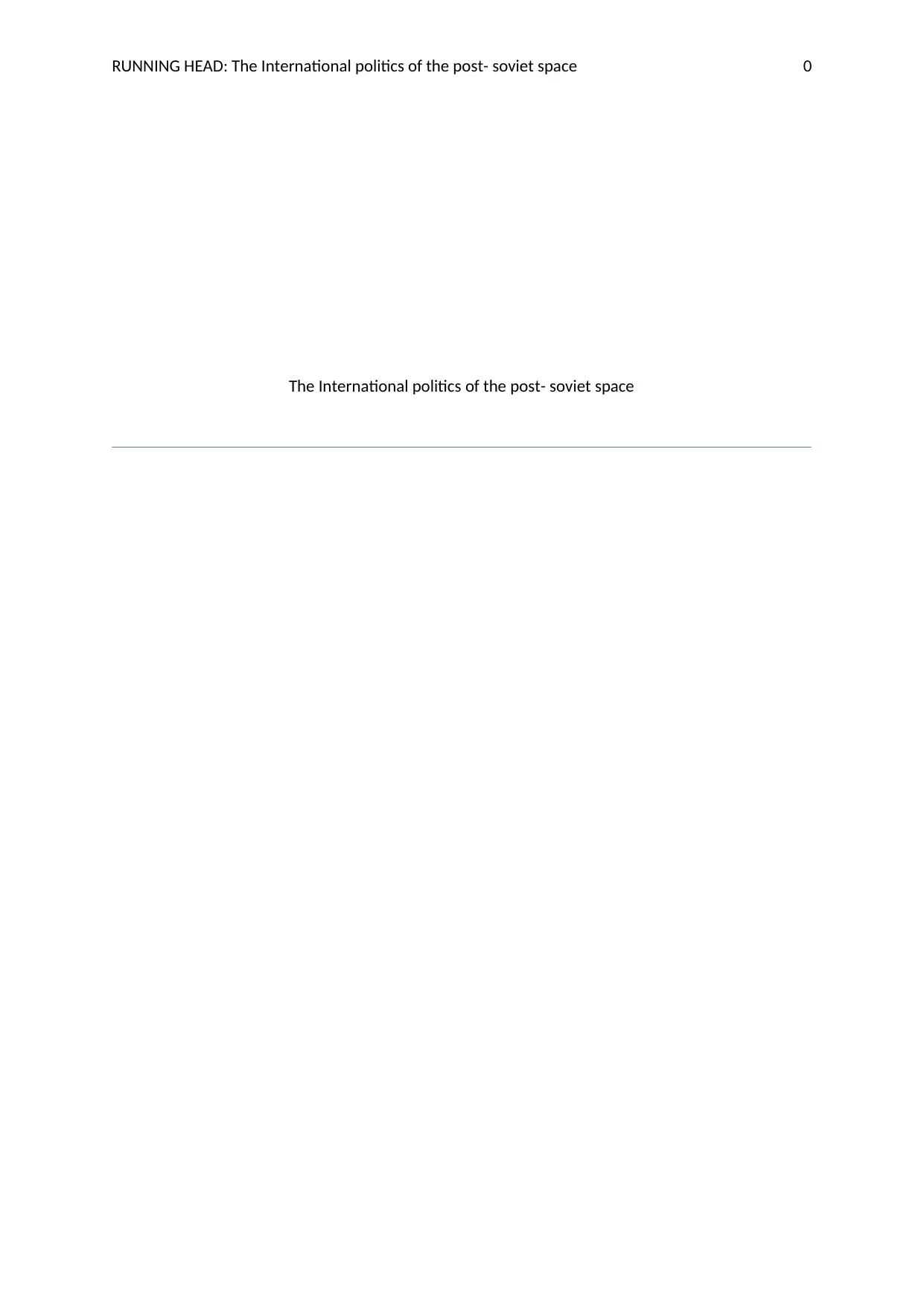
RUNNING HEAD: The International politics of the post- soviet space 0
The International politics of the post- soviet space
The International politics of the post- soviet space
Paraphrase This Document
Need a fresh take? Get an instant paraphrase of this document with our AI Paraphraser
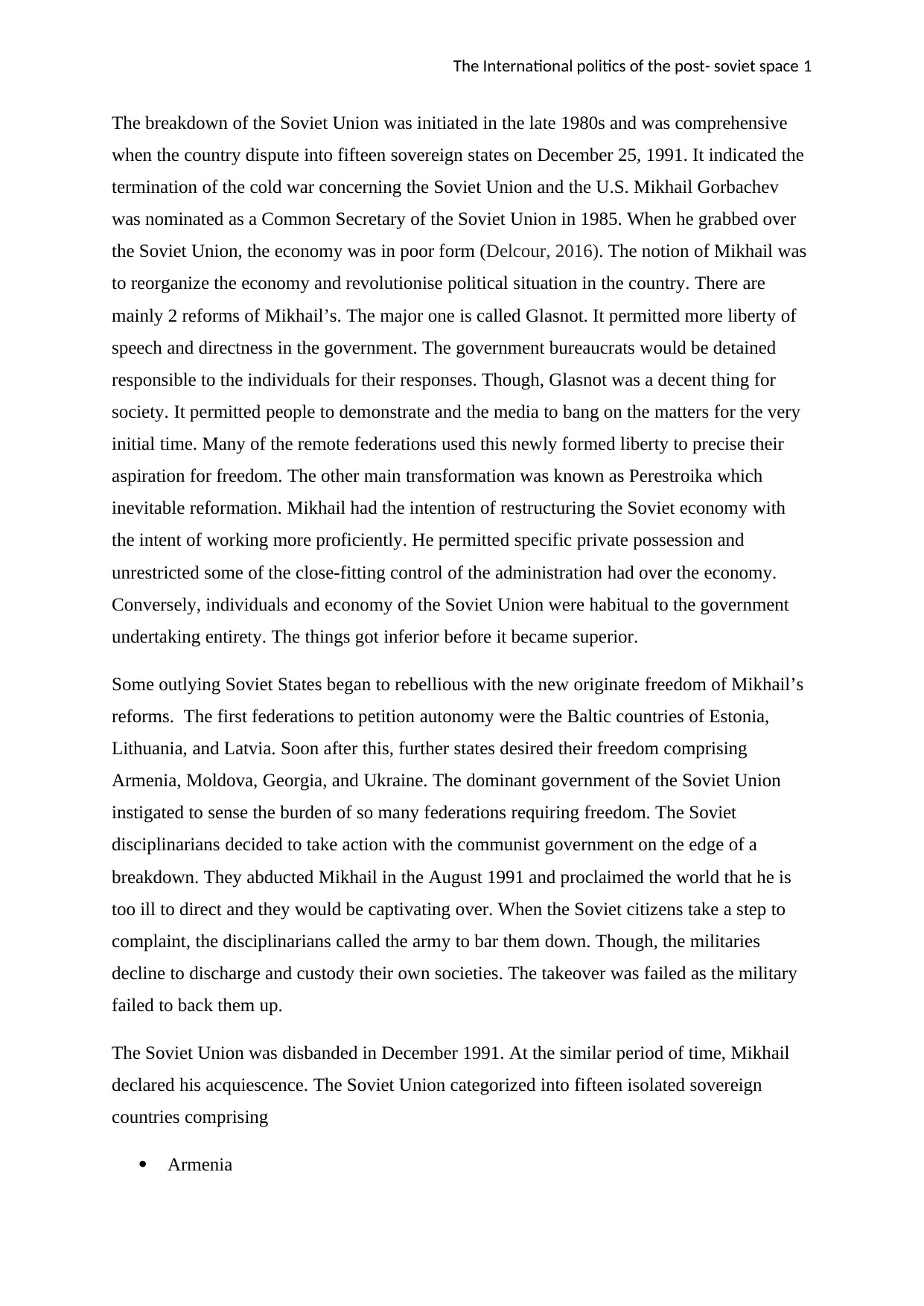
The International politics of the post- soviet space 1
The breakdown of the Soviet Union was initiated in the late 1980s and was comprehensive
when the country dispute into fifteen sovereign states on December 25, 1991. It indicated the
termination of the cold war concerning the Soviet Union and the U.S. Mikhail Gorbachev
was nominated as a Common Secretary of the Soviet Union in 1985. When he grabbed over
the Soviet Union, the economy was in poor form (Delcour, 2016). The notion of Mikhail was
to reorganize the economy and revolutionise political situation in the country. There are
mainly 2 reforms of Mikhail’s. The major one is called Glasnot. It permitted more liberty of
speech and directness in the government. The government bureaucrats would be detained
responsible to the individuals for their responses. Though, Glasnot was a decent thing for
society. It permitted people to demonstrate and the media to bang on the matters for the very
initial time. Many of the remote federations used this newly formed liberty to precise their
aspiration for freedom. The other main transformation was known as Perestroika which
inevitable reformation. Mikhail had the intention of restructuring the Soviet economy with
the intent of working more proficiently. He permitted specific private possession and
unrestricted some of the close-fitting control of the administration had over the economy.
Conversely, individuals and economy of the Soviet Union were habitual to the government
undertaking entirety. The things got inferior before it became superior.
Some outlying Soviet States began to rebellious with the new originate freedom of Mikhail’s
reforms. The first federations to petition autonomy were the Baltic countries of Estonia,
Lithuania, and Latvia. Soon after this, further states desired their freedom comprising
Armenia, Moldova, Georgia, and Ukraine. The dominant government of the Soviet Union
instigated to sense the burden of so many federations requiring freedom. The Soviet
disciplinarians decided to take action with the communist government on the edge of a
breakdown. They abducted Mikhail in the August 1991 and proclaimed the world that he is
too ill to direct and they would be captivating over. When the Soviet citizens take a step to
complaint, the disciplinarians called the army to bar them down. Though, the militaries
decline to discharge and custody their own societies. The takeover was failed as the military
failed to back them up.
The Soviet Union was disbanded in December 1991. At the similar period of time, Mikhail
declared his acquiescence. The Soviet Union categorized into fifteen isolated sovereign
countries comprising
Armenia
The breakdown of the Soviet Union was initiated in the late 1980s and was comprehensive
when the country dispute into fifteen sovereign states on December 25, 1991. It indicated the
termination of the cold war concerning the Soviet Union and the U.S. Mikhail Gorbachev
was nominated as a Common Secretary of the Soviet Union in 1985. When he grabbed over
the Soviet Union, the economy was in poor form (Delcour, 2016). The notion of Mikhail was
to reorganize the economy and revolutionise political situation in the country. There are
mainly 2 reforms of Mikhail’s. The major one is called Glasnot. It permitted more liberty of
speech and directness in the government. The government bureaucrats would be detained
responsible to the individuals for their responses. Though, Glasnot was a decent thing for
society. It permitted people to demonstrate and the media to bang on the matters for the very
initial time. Many of the remote federations used this newly formed liberty to precise their
aspiration for freedom. The other main transformation was known as Perestroika which
inevitable reformation. Mikhail had the intention of restructuring the Soviet economy with
the intent of working more proficiently. He permitted specific private possession and
unrestricted some of the close-fitting control of the administration had over the economy.
Conversely, individuals and economy of the Soviet Union were habitual to the government
undertaking entirety. The things got inferior before it became superior.
Some outlying Soviet States began to rebellious with the new originate freedom of Mikhail’s
reforms. The first federations to petition autonomy were the Baltic countries of Estonia,
Lithuania, and Latvia. Soon after this, further states desired their freedom comprising
Armenia, Moldova, Georgia, and Ukraine. The dominant government of the Soviet Union
instigated to sense the burden of so many federations requiring freedom. The Soviet
disciplinarians decided to take action with the communist government on the edge of a
breakdown. They abducted Mikhail in the August 1991 and proclaimed the world that he is
too ill to direct and they would be captivating over. When the Soviet citizens take a step to
complaint, the disciplinarians called the army to bar them down. Though, the militaries
decline to discharge and custody their own societies. The takeover was failed as the military
failed to back them up.
The Soviet Union was disbanded in December 1991. At the similar period of time, Mikhail
declared his acquiescence. The Soviet Union categorized into fifteen isolated sovereign
countries comprising
Armenia
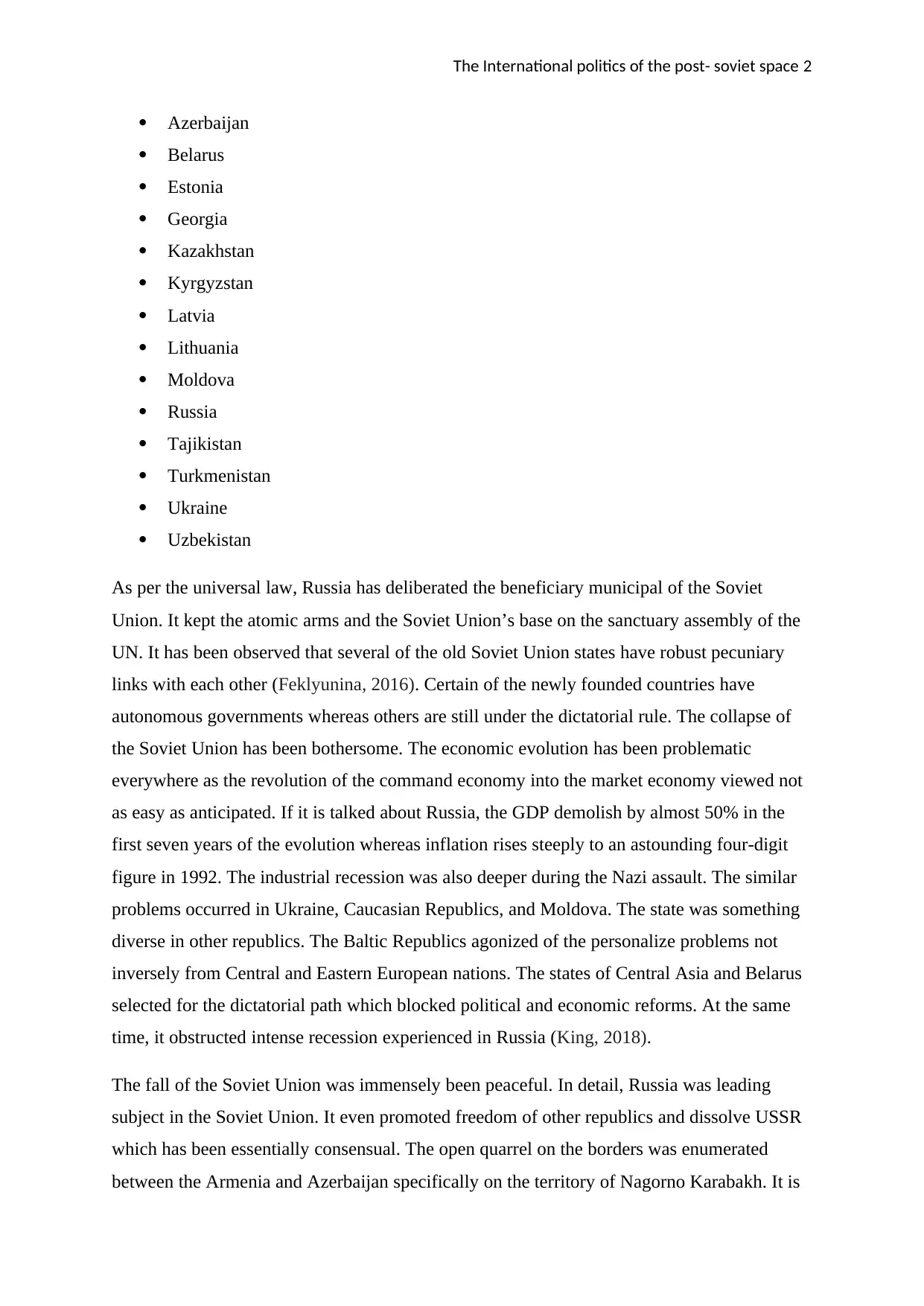
The International politics of the post- soviet space 2
Azerbaijan
Belarus
Estonia
Georgia
Kazakhstan
Kyrgyzstan
Latvia
Lithuania
Moldova
Russia
Tajikistan
Turkmenistan
Ukraine
Uzbekistan
As per the universal law, Russia has deliberated the beneficiary municipal of the Soviet
Union. It kept the atomic arms and the Soviet Union’s base on the sanctuary assembly of the
UN. It has been observed that several of the old Soviet Union states have robust pecuniary
links with each other (Feklyunina, 2016). Certain of the newly founded countries have
autonomous governments whereas others are still under the dictatorial rule. The collapse of
the Soviet Union has been bothersome. The economic evolution has been problematic
everywhere as the revolution of the command economy into the market economy viewed not
as easy as anticipated. If it is talked about Russia, the GDP demolish by almost 50% in the
first seven years of the evolution whereas inflation rises steeply to an astounding four-digit
figure in 1992. The industrial recession was also deeper during the Nazi assault. The similar
problems occurred in Ukraine, Caucasian Republics, and Moldova. The state was something
diverse in other republics. The Baltic Republics agonized of the personalize problems not
inversely from Central and Eastern European nations. The states of Central Asia and Belarus
selected for the dictatorial path which blocked political and economic reforms. At the same
time, it obstructed intense recession experienced in Russia (King, 2018).
The fall of the Soviet Union was immensely been peaceful. In detail, Russia was leading
subject in the Soviet Union. It even promoted freedom of other republics and dissolve USSR
which has been essentially consensual. The open quarrel on the borders was enumerated
between the Armenia and Azerbaijan specifically on the territory of Nagorno Karabakh. It is
Azerbaijan
Belarus
Estonia
Georgia
Kazakhstan
Kyrgyzstan
Latvia
Lithuania
Moldova
Russia
Tajikistan
Turkmenistan
Ukraine
Uzbekistan
As per the universal law, Russia has deliberated the beneficiary municipal of the Soviet
Union. It kept the atomic arms and the Soviet Union’s base on the sanctuary assembly of the
UN. It has been observed that several of the old Soviet Union states have robust pecuniary
links with each other (Feklyunina, 2016). Certain of the newly founded countries have
autonomous governments whereas others are still under the dictatorial rule. The collapse of
the Soviet Union has been bothersome. The economic evolution has been problematic
everywhere as the revolution of the command economy into the market economy viewed not
as easy as anticipated. If it is talked about Russia, the GDP demolish by almost 50% in the
first seven years of the evolution whereas inflation rises steeply to an astounding four-digit
figure in 1992. The industrial recession was also deeper during the Nazi assault. The similar
problems occurred in Ukraine, Caucasian Republics, and Moldova. The state was something
diverse in other republics. The Baltic Republics agonized of the personalize problems not
inversely from Central and Eastern European nations. The states of Central Asia and Belarus
selected for the dictatorial path which blocked political and economic reforms. At the same
time, it obstructed intense recession experienced in Russia (King, 2018).
The fall of the Soviet Union was immensely been peaceful. In detail, Russia was leading
subject in the Soviet Union. It even promoted freedom of other republics and dissolve USSR
which has been essentially consensual. The open quarrel on the borders was enumerated
between the Armenia and Azerbaijan specifically on the territory of Nagorno Karabakh. It is
⊘ This is a preview!⊘
Do you want full access?
Subscribe today to unlock all pages.

Trusted by 1+ million students worldwide
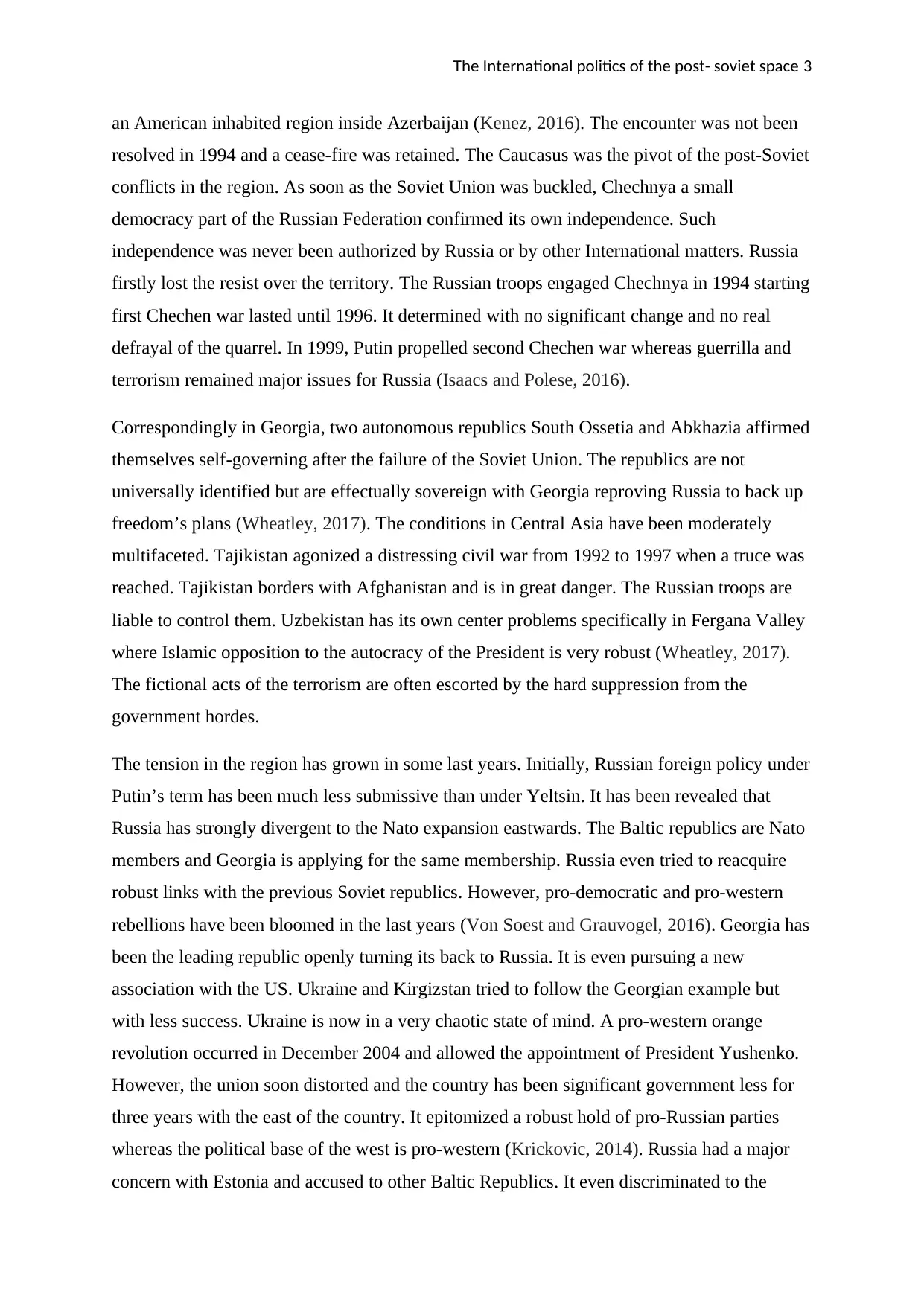
The International politics of the post- soviet space 3
an American inhabited region inside Azerbaijan (Kenez, 2016). The encounter was not been
resolved in 1994 and a cease-fire was retained. The Caucasus was the pivot of the post-Soviet
conflicts in the region. As soon as the Soviet Union was buckled, Chechnya a small
democracy part of the Russian Federation confirmed its own independence. Such
independence was never been authorized by Russia or by other International matters. Russia
firstly lost the resist over the territory. The Russian troops engaged Chechnya in 1994 starting
first Chechen war lasted until 1996. It determined with no significant change and no real
defrayal of the quarrel. In 1999, Putin propelled second Chechen war whereas guerrilla and
terrorism remained major issues for Russia (Isaacs and Polese, 2016).
Correspondingly in Georgia, two autonomous republics South Ossetia and Abkhazia affirmed
themselves self-governing after the failure of the Soviet Union. The republics are not
universally identified but are effectually sovereign with Georgia reproving Russia to back up
freedom’s plans (Wheatley, 2017). The conditions in Central Asia have been moderately
multifaceted. Tajikistan agonized a distressing civil war from 1992 to 1997 when a truce was
reached. Tajikistan borders with Afghanistan and is in great danger. The Russian troops are
liable to control them. Uzbekistan has its own center problems specifically in Fergana Valley
where Islamic opposition to the autocracy of the President is very robust (Wheatley, 2017).
The fictional acts of the terrorism are often escorted by the hard suppression from the
government hordes.
The tension in the region has grown in some last years. Initially, Russian foreign policy under
Putin’s term has been much less submissive than under Yeltsin. It has been revealed that
Russia has strongly divergent to the Nato expansion eastwards. The Baltic republics are Nato
members and Georgia is applying for the same membership. Russia even tried to reacquire
robust links with the previous Soviet republics. However, pro-democratic and pro-western
rebellions have been bloomed in the last years (Von Soest and Grauvogel, 2016). Georgia has
been the leading republic openly turning its back to Russia. It is even pursuing a new
association with the US. Ukraine and Kirgizstan tried to follow the Georgian example but
with less success. Ukraine is now in a very chaotic state of mind. A pro-western orange
revolution occurred in December 2004 and allowed the appointment of President Yushenko.
However, the union soon distorted and the country has been significant government less for
three years with the east of the country. It epitomized a robust hold of pro-Russian parties
whereas the political base of the west is pro-western (Krickovic, 2014). Russia had a major
concern with Estonia and accused to other Baltic Republics. It even discriminated to the
an American inhabited region inside Azerbaijan (Kenez, 2016). The encounter was not been
resolved in 1994 and a cease-fire was retained. The Caucasus was the pivot of the post-Soviet
conflicts in the region. As soon as the Soviet Union was buckled, Chechnya a small
democracy part of the Russian Federation confirmed its own independence. Such
independence was never been authorized by Russia or by other International matters. Russia
firstly lost the resist over the territory. The Russian troops engaged Chechnya in 1994 starting
first Chechen war lasted until 1996. It determined with no significant change and no real
defrayal of the quarrel. In 1999, Putin propelled second Chechen war whereas guerrilla and
terrorism remained major issues for Russia (Isaacs and Polese, 2016).
Correspondingly in Georgia, two autonomous republics South Ossetia and Abkhazia affirmed
themselves self-governing after the failure of the Soviet Union. The republics are not
universally identified but are effectually sovereign with Georgia reproving Russia to back up
freedom’s plans (Wheatley, 2017). The conditions in Central Asia have been moderately
multifaceted. Tajikistan agonized a distressing civil war from 1992 to 1997 when a truce was
reached. Tajikistan borders with Afghanistan and is in great danger. The Russian troops are
liable to control them. Uzbekistan has its own center problems specifically in Fergana Valley
where Islamic opposition to the autocracy of the President is very robust (Wheatley, 2017).
The fictional acts of the terrorism are often escorted by the hard suppression from the
government hordes.
The tension in the region has grown in some last years. Initially, Russian foreign policy under
Putin’s term has been much less submissive than under Yeltsin. It has been revealed that
Russia has strongly divergent to the Nato expansion eastwards. The Baltic republics are Nato
members and Georgia is applying for the same membership. Russia even tried to reacquire
robust links with the previous Soviet republics. However, pro-democratic and pro-western
rebellions have been bloomed in the last years (Von Soest and Grauvogel, 2016). Georgia has
been the leading republic openly turning its back to Russia. It is even pursuing a new
association with the US. Ukraine and Kirgizstan tried to follow the Georgian example but
with less success. Ukraine is now in a very chaotic state of mind. A pro-western orange
revolution occurred in December 2004 and allowed the appointment of President Yushenko.
However, the union soon distorted and the country has been significant government less for
three years with the east of the country. It epitomized a robust hold of pro-Russian parties
whereas the political base of the west is pro-western (Krickovic, 2014). Russia had a major
concern with Estonia and accused to other Baltic Republics. It even discriminated to the
Paraphrase This Document
Need a fresh take? Get an instant paraphrase of this document with our AI Paraphraser
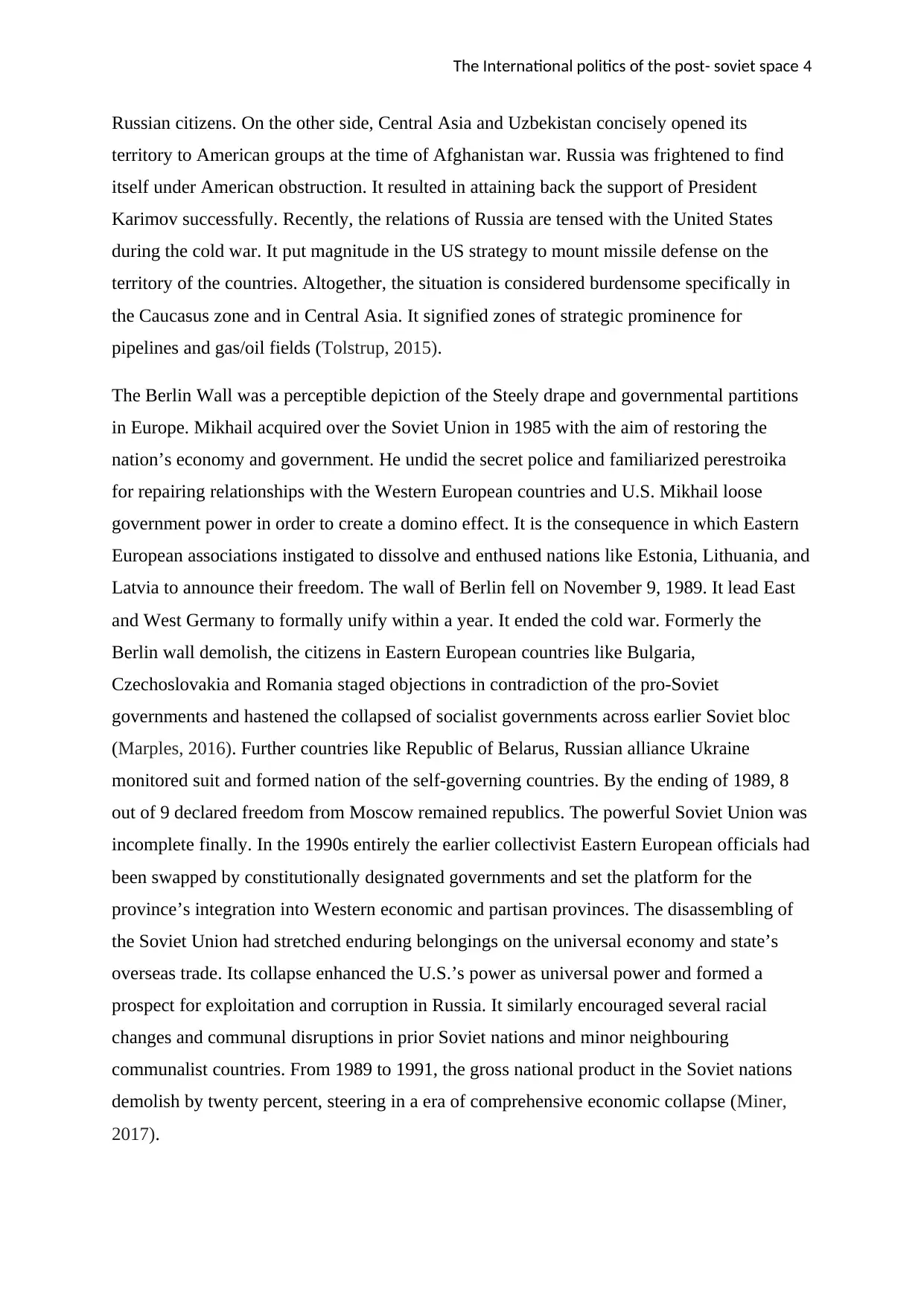
The International politics of the post- soviet space 4
Russian citizens. On the other side, Central Asia and Uzbekistan concisely opened its
territory to American groups at the time of Afghanistan war. Russia was frightened to find
itself under American obstruction. It resulted in attaining back the support of President
Karimov successfully. Recently, the relations of Russia are tensed with the United States
during the cold war. It put magnitude in the US strategy to mount missile defense on the
territory of the countries. Altogether, the situation is considered burdensome specifically in
the Caucasus zone and in Central Asia. It signified zones of strategic prominence for
pipelines and gas/oil fields (Tolstrup, 2015).
The Berlin Wall was a perceptible depiction of the Steely drape and governmental partitions
in Europe. Mikhail acquired over the Soviet Union in 1985 with the aim of restoring the
nation’s economy and government. He undid the secret police and familiarized perestroika
for repairing relationships with the Western European countries and U.S. Mikhail loose
government power in order to create a domino effect. It is the consequence in which Eastern
European associations instigated to dissolve and enthused nations like Estonia, Lithuania, and
Latvia to announce their freedom. The wall of Berlin fell on November 9, 1989. It lead East
and West Germany to formally unify within a year. It ended the cold war. Formerly the
Berlin wall demolish, the citizens in Eastern European countries like Bulgaria,
Czechoslovakia and Romania staged objections in contradiction of the pro-Soviet
governments and hastened the collapsed of socialist governments across earlier Soviet bloc
(Marples, 2016). Further countries like Republic of Belarus, Russian alliance Ukraine
monitored suit and formed nation of the self-governing countries. By the ending of 1989, 8
out of 9 declared freedom from Moscow remained republics. The powerful Soviet Union was
incomplete finally. In the 1990s entirely the earlier collectivist Eastern European officials had
been swapped by constitutionally designated governments and set the platform for the
province’s integration into Western economic and partisan provinces. The disassembling of
the Soviet Union had stretched enduring belongings on the universal economy and state’s
overseas trade. Its collapse enhanced the U.S.’s power as universal power and formed a
prospect for exploitation and corruption in Russia. It similarly encouraged several racial
changes and communal disruptions in prior Soviet nations and minor neighbouring
communalist countries. From 1989 to 1991, the gross national product in the Soviet nations
demolish by twenty percent, steering in a era of comprehensive economic collapse (Miner,
2017).
Russian citizens. On the other side, Central Asia and Uzbekistan concisely opened its
territory to American groups at the time of Afghanistan war. Russia was frightened to find
itself under American obstruction. It resulted in attaining back the support of President
Karimov successfully. Recently, the relations of Russia are tensed with the United States
during the cold war. It put magnitude in the US strategy to mount missile defense on the
territory of the countries. Altogether, the situation is considered burdensome specifically in
the Caucasus zone and in Central Asia. It signified zones of strategic prominence for
pipelines and gas/oil fields (Tolstrup, 2015).
The Berlin Wall was a perceptible depiction of the Steely drape and governmental partitions
in Europe. Mikhail acquired over the Soviet Union in 1985 with the aim of restoring the
nation’s economy and government. He undid the secret police and familiarized perestroika
for repairing relationships with the Western European countries and U.S. Mikhail loose
government power in order to create a domino effect. It is the consequence in which Eastern
European associations instigated to dissolve and enthused nations like Estonia, Lithuania, and
Latvia to announce their freedom. The wall of Berlin fell on November 9, 1989. It lead East
and West Germany to formally unify within a year. It ended the cold war. Formerly the
Berlin wall demolish, the citizens in Eastern European countries like Bulgaria,
Czechoslovakia and Romania staged objections in contradiction of the pro-Soviet
governments and hastened the collapsed of socialist governments across earlier Soviet bloc
(Marples, 2016). Further countries like Republic of Belarus, Russian alliance Ukraine
monitored suit and formed nation of the self-governing countries. By the ending of 1989, 8
out of 9 declared freedom from Moscow remained republics. The powerful Soviet Union was
incomplete finally. In the 1990s entirely the earlier collectivist Eastern European officials had
been swapped by constitutionally designated governments and set the platform for the
province’s integration into Western economic and partisan provinces. The disassembling of
the Soviet Union had stretched enduring belongings on the universal economy and state’s
overseas trade. Its collapse enhanced the U.S.’s power as universal power and formed a
prospect for exploitation and corruption in Russia. It similarly encouraged several racial
changes and communal disruptions in prior Soviet nations and minor neighbouring
communalist countries. From 1989 to 1991, the gross national product in the Soviet nations
demolish by twenty percent, steering in a era of comprehensive economic collapse (Miner,
2017).
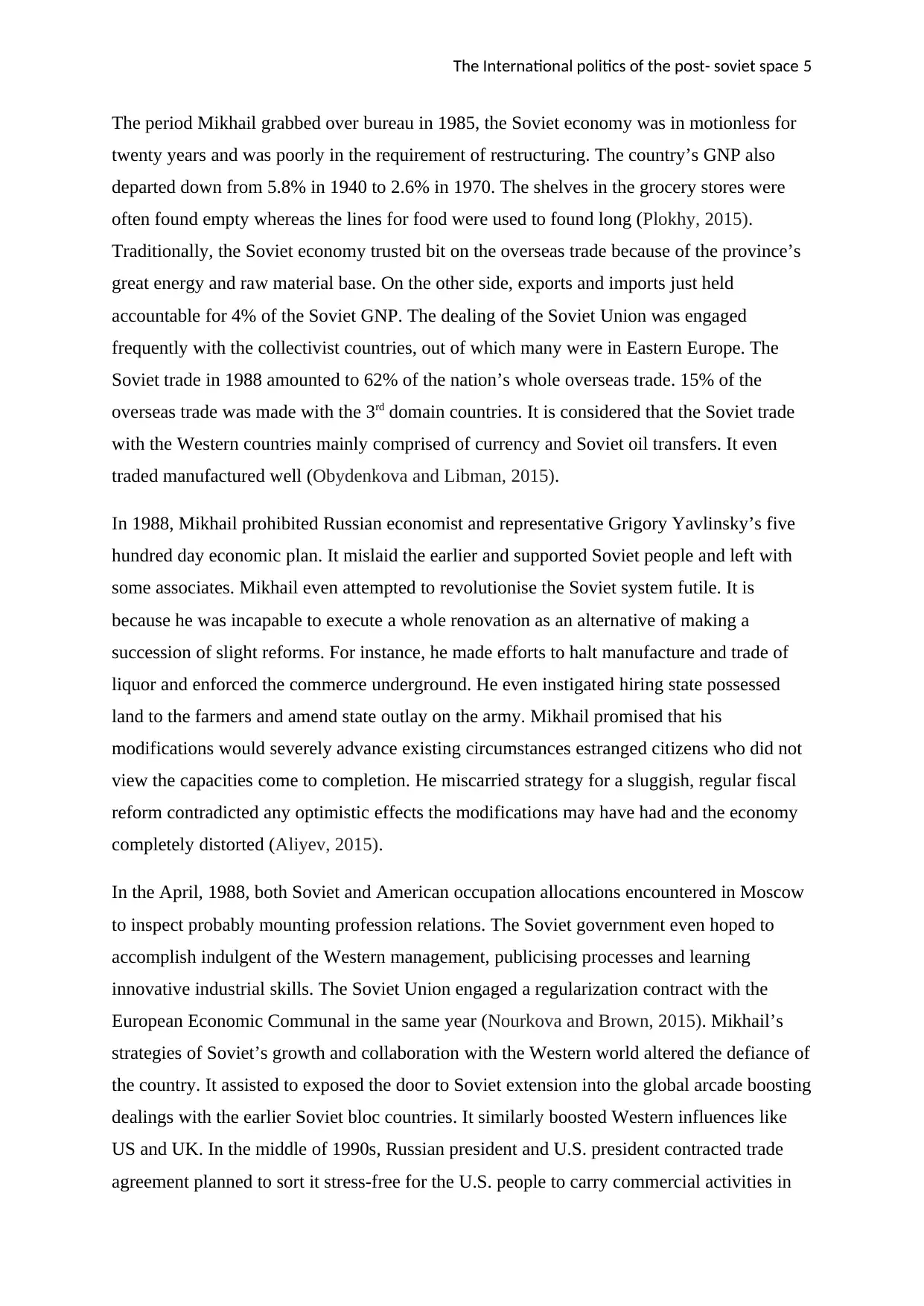
The International politics of the post- soviet space 5
The period Mikhail grabbed over bureau in 1985, the Soviet economy was in motionless for
twenty years and was poorly in the requirement of restructuring. The country’s GNP also
departed down from 5.8% in 1940 to 2.6% in 1970. The shelves in the grocery stores were
often found empty whereas the lines for food were used to found long (Plokhy, 2015).
Traditionally, the Soviet economy trusted bit on the overseas trade because of the province’s
great energy and raw material base. On the other side, exports and imports just held
accountable for 4% of the Soviet GNP. The dealing of the Soviet Union was engaged
frequently with the collectivist countries, out of which many were in Eastern Europe. The
Soviet trade in 1988 amounted to 62% of the nation’s whole overseas trade. 15% of the
overseas trade was made with the 3rd domain countries. It is considered that the Soviet trade
with the Western countries mainly comprised of currency and Soviet oil transfers. It even
traded manufactured well (Obydenkova and Libman, 2015).
In 1988, Mikhail prohibited Russian economist and representative Grigory Yavlinsky’s five
hundred day economic plan. It mislaid the earlier and supported Soviet people and left with
some associates. Mikhail even attempted to revolutionise the Soviet system futile. It is
because he was incapable to execute a whole renovation as an alternative of making a
succession of slight reforms. For instance, he made efforts to halt manufacture and trade of
liquor and enforced the commerce underground. He even instigated hiring state possessed
land to the farmers and amend state outlay on the army. Mikhail promised that his
modifications would severely advance existing circumstances estranged citizens who did not
view the capacities come to completion. He miscarried strategy for a sluggish, regular fiscal
reform contradicted any optimistic effects the modifications may have had and the economy
completely distorted (Aliyev, 2015).
In the April, 1988, both Soviet and American occupation allocations encountered in Moscow
to inspect probably mounting profession relations. The Soviet government even hoped to
accomplish indulgent of the Western management, publicising processes and learning
innovative industrial skills. The Soviet Union engaged a regularization contract with the
European Economic Communal in the same year (Nourkova and Brown, 2015). Mikhail’s
strategies of Soviet’s growth and collaboration with the Western world altered the defiance of
the country. It assisted to exposed the door to Soviet extension into the global arcade boosting
dealings with the earlier Soviet bloc countries. It similarly boosted Western influences like
US and UK. In the middle of 1990s, Russian president and U.S. president contracted trade
agreement planned to sort it stress-free for the U.S. people to carry commercial activities in
The period Mikhail grabbed over bureau in 1985, the Soviet economy was in motionless for
twenty years and was poorly in the requirement of restructuring. The country’s GNP also
departed down from 5.8% in 1940 to 2.6% in 1970. The shelves in the grocery stores were
often found empty whereas the lines for food were used to found long (Plokhy, 2015).
Traditionally, the Soviet economy trusted bit on the overseas trade because of the province’s
great energy and raw material base. On the other side, exports and imports just held
accountable for 4% of the Soviet GNP. The dealing of the Soviet Union was engaged
frequently with the collectivist countries, out of which many were in Eastern Europe. The
Soviet trade in 1988 amounted to 62% of the nation’s whole overseas trade. 15% of the
overseas trade was made with the 3rd domain countries. It is considered that the Soviet trade
with the Western countries mainly comprised of currency and Soviet oil transfers. It even
traded manufactured well (Obydenkova and Libman, 2015).
In 1988, Mikhail prohibited Russian economist and representative Grigory Yavlinsky’s five
hundred day economic plan. It mislaid the earlier and supported Soviet people and left with
some associates. Mikhail even attempted to revolutionise the Soviet system futile. It is
because he was incapable to execute a whole renovation as an alternative of making a
succession of slight reforms. For instance, he made efforts to halt manufacture and trade of
liquor and enforced the commerce underground. He even instigated hiring state possessed
land to the farmers and amend state outlay on the army. Mikhail promised that his
modifications would severely advance existing circumstances estranged citizens who did not
view the capacities come to completion. He miscarried strategy for a sluggish, regular fiscal
reform contradicted any optimistic effects the modifications may have had and the economy
completely distorted (Aliyev, 2015).
In the April, 1988, both Soviet and American occupation allocations encountered in Moscow
to inspect probably mounting profession relations. The Soviet government even hoped to
accomplish indulgent of the Western management, publicising processes and learning
innovative industrial skills. The Soviet Union engaged a regularization contract with the
European Economic Communal in the same year (Nourkova and Brown, 2015). Mikhail’s
strategies of Soviet’s growth and collaboration with the Western world altered the defiance of
the country. It assisted to exposed the door to Soviet extension into the global arcade boosting
dealings with the earlier Soviet bloc countries. It similarly boosted Western influences like
US and UK. In the middle of 1990s, Russian president and U.S. president contracted trade
agreement planned to sort it stress-free for the U.S. people to carry commercial activities in
⊘ This is a preview!⊘
Do you want full access?
Subscribe today to unlock all pages.

Trusted by 1+ million students worldwide
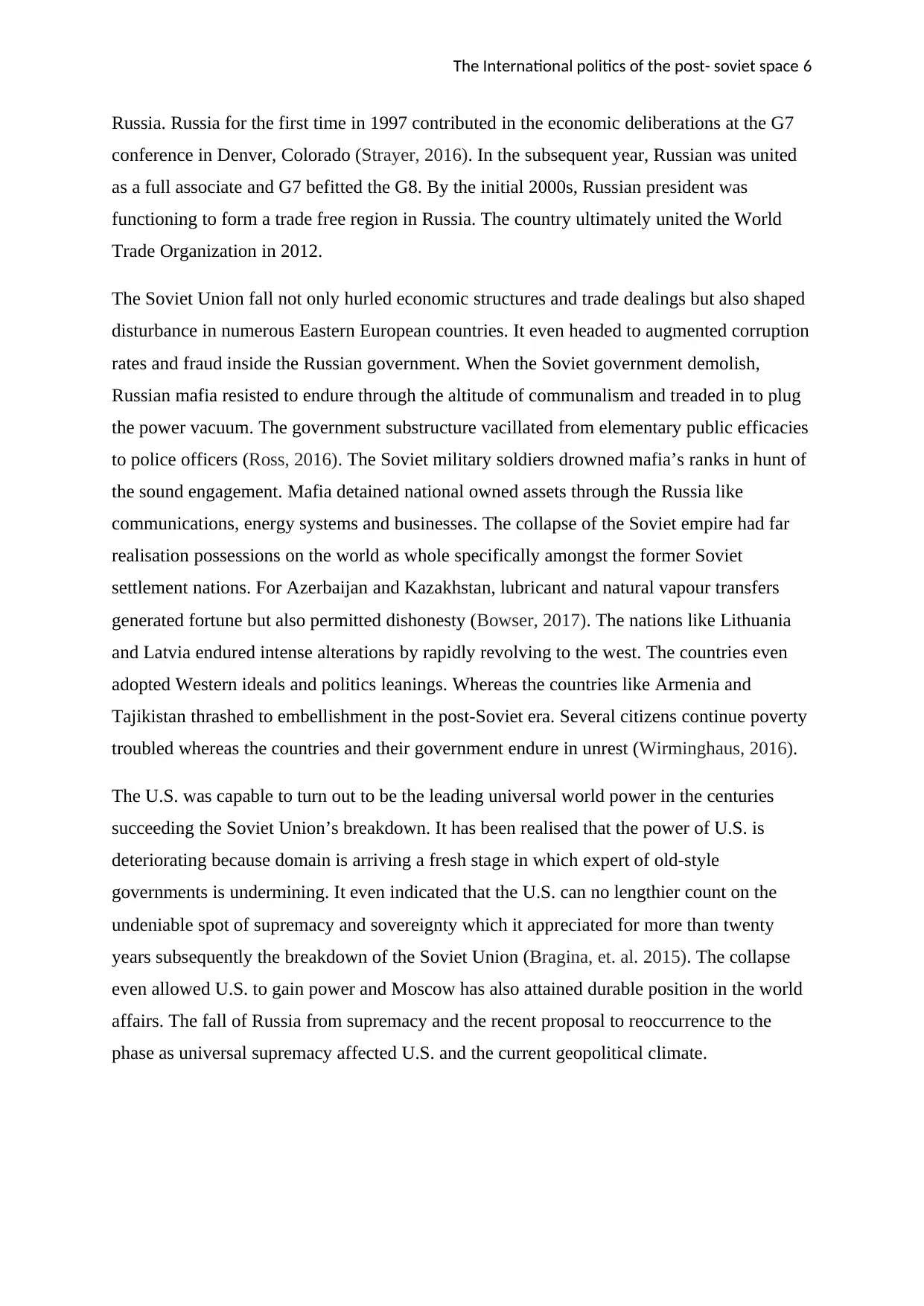
The International politics of the post- soviet space 6
Russia. Russia for the first time in 1997 contributed in the economic deliberations at the G7
conference in Denver, Colorado (Strayer, 2016). In the subsequent year, Russian was united
as a full associate and G7 befitted the G8. By the initial 2000s, Russian president was
functioning to form a trade free region in Russia. The country ultimately united the World
Trade Organization in 2012.
The Soviet Union fall not only hurled economic structures and trade dealings but also shaped
disturbance in numerous Eastern European countries. It even headed to augmented corruption
rates and fraud inside the Russian government. When the Soviet government demolish,
Russian mafia resisted to endure through the altitude of communalism and treaded in to plug
the power vacuum. The government substructure vacillated from elementary public efficacies
to police officers (Ross, 2016). The Soviet military soldiers drowned mafia’s ranks in hunt of
the sound engagement. Mafia detained national owned assets through the Russia like
communications, energy systems and businesses. The collapse of the Soviet empire had far
realisation possessions on the world as whole specifically amongst the former Soviet
settlement nations. For Azerbaijan and Kazakhstan, lubricant and natural vapour transfers
generated fortune but also permitted dishonesty (Bowser, 2017). The nations like Lithuania
and Latvia endured intense alterations by rapidly revolving to the west. The countries even
adopted Western ideals and politics leanings. Whereas the countries like Armenia and
Tajikistan thrashed to embellishment in the post-Soviet era. Several citizens continue poverty
troubled whereas the countries and their government endure in unrest (Wirminghaus, 2016).
The U.S. was capable to turn out to be the leading universal world power in the centuries
succeeding the Soviet Union’s breakdown. It has been realised that the power of U.S. is
deteriorating because domain is arriving a fresh stage in which expert of old-style
governments is undermining. It even indicated that the U.S. can no lengthier count on the
undeniable spot of supremacy and sovereignty which it appreciated for more than twenty
years subsequently the breakdown of the Soviet Union (Bragina, et. al. 2015). The collapse
even allowed U.S. to gain power and Moscow has also attained durable position in the world
affairs. The fall of Russia from supremacy and the recent proposal to reoccurrence to the
phase as universal supremacy affected U.S. and the current geopolitical climate.
Russia. Russia for the first time in 1997 contributed in the economic deliberations at the G7
conference in Denver, Colorado (Strayer, 2016). In the subsequent year, Russian was united
as a full associate and G7 befitted the G8. By the initial 2000s, Russian president was
functioning to form a trade free region in Russia. The country ultimately united the World
Trade Organization in 2012.
The Soviet Union fall not only hurled economic structures and trade dealings but also shaped
disturbance in numerous Eastern European countries. It even headed to augmented corruption
rates and fraud inside the Russian government. When the Soviet government demolish,
Russian mafia resisted to endure through the altitude of communalism and treaded in to plug
the power vacuum. The government substructure vacillated from elementary public efficacies
to police officers (Ross, 2016). The Soviet military soldiers drowned mafia’s ranks in hunt of
the sound engagement. Mafia detained national owned assets through the Russia like
communications, energy systems and businesses. The collapse of the Soviet empire had far
realisation possessions on the world as whole specifically amongst the former Soviet
settlement nations. For Azerbaijan and Kazakhstan, lubricant and natural vapour transfers
generated fortune but also permitted dishonesty (Bowser, 2017). The nations like Lithuania
and Latvia endured intense alterations by rapidly revolving to the west. The countries even
adopted Western ideals and politics leanings. Whereas the countries like Armenia and
Tajikistan thrashed to embellishment in the post-Soviet era. Several citizens continue poverty
troubled whereas the countries and their government endure in unrest (Wirminghaus, 2016).
The U.S. was capable to turn out to be the leading universal world power in the centuries
succeeding the Soviet Union’s breakdown. It has been realised that the power of U.S. is
deteriorating because domain is arriving a fresh stage in which expert of old-style
governments is undermining. It even indicated that the U.S. can no lengthier count on the
undeniable spot of supremacy and sovereignty which it appreciated for more than twenty
years subsequently the breakdown of the Soviet Union (Bragina, et. al. 2015). The collapse
even allowed U.S. to gain power and Moscow has also attained durable position in the world
affairs. The fall of Russia from supremacy and the recent proposal to reoccurrence to the
phase as universal supremacy affected U.S. and the current geopolitical climate.
Paraphrase This Document
Need a fresh take? Get an instant paraphrase of this document with our AI Paraphraser
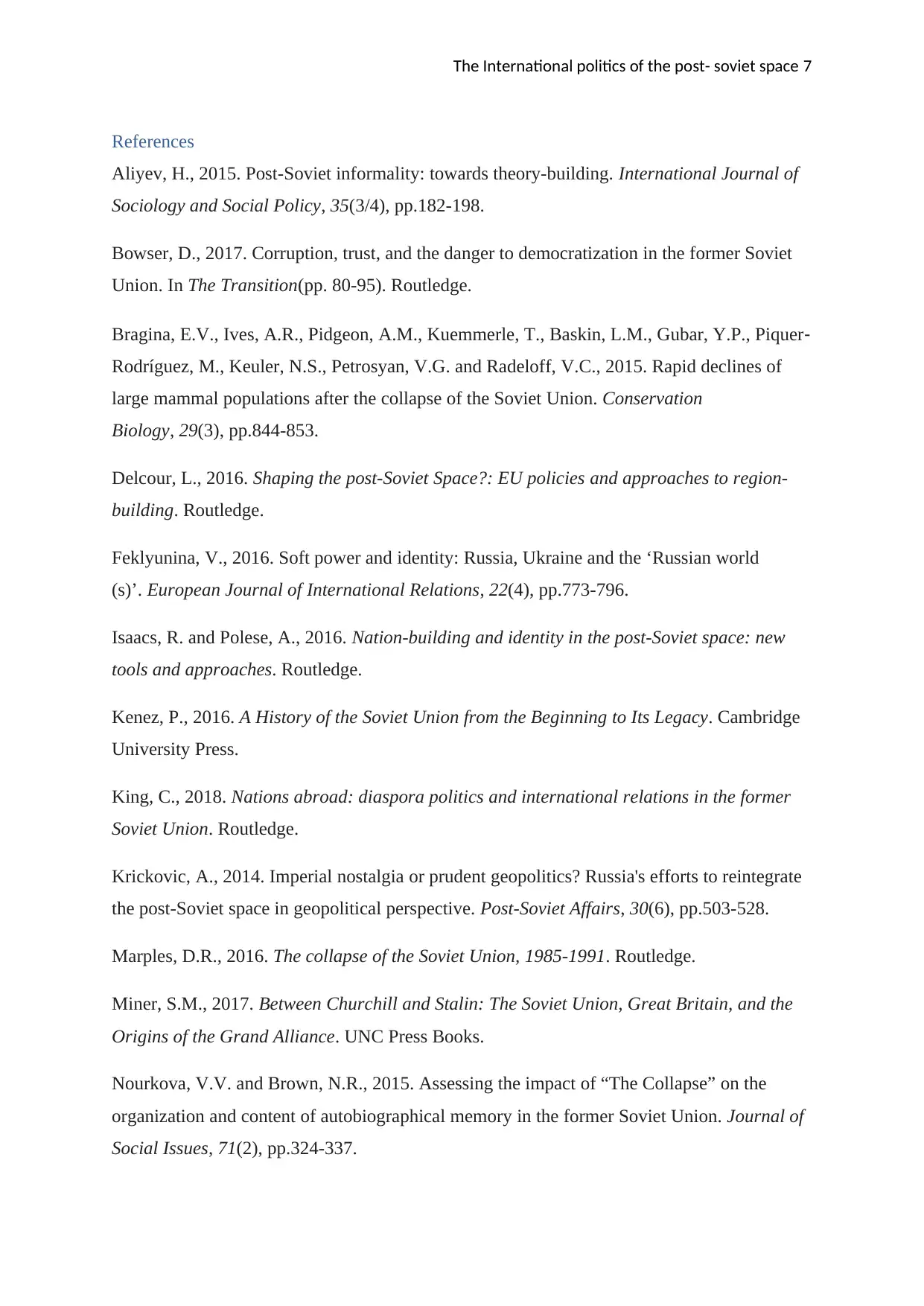
The International politics of the post- soviet space 7
References
Aliyev, H., 2015. Post-Soviet informality: towards theory-building. International Journal of
Sociology and Social Policy, 35(3/4), pp.182-198.
Bowser, D., 2017. Corruption, trust, and the danger to democratization in the former Soviet
Union. In The Transition(pp. 80-95). Routledge.
Bragina, E.V., Ives, A.R., Pidgeon, A.M., Kuemmerle, T., Baskin, L.M., Gubar, Y.P., Piquer‐
Rodríguez, M., Keuler, N.S., Petrosyan, V.G. and Radeloff, V.C., 2015. Rapid declines of
large mammal populations after the collapse of the Soviet Union. Conservation
Biology, 29(3), pp.844-853.
Delcour, L., 2016. Shaping the post-Soviet Space?: EU policies and approaches to region-
building. Routledge.
Feklyunina, V., 2016. Soft power and identity: Russia, Ukraine and the ‘Russian world
(s)’. European Journal of International Relations, 22(4), pp.773-796.
Isaacs, R. and Polese, A., 2016. Nation-building and identity in the post-Soviet space: new
tools and approaches. Routledge.
Kenez, P., 2016. A History of the Soviet Union from the Beginning to Its Legacy. Cambridge
University Press.
King, C., 2018. Nations abroad: diaspora politics and international relations in the former
Soviet Union. Routledge.
Krickovic, A., 2014. Imperial nostalgia or prudent geopolitics? Russia's efforts to reintegrate
the post-Soviet space in geopolitical perspective. Post-Soviet Affairs, 30(6), pp.503-528.
Marples, D.R., 2016. The collapse of the Soviet Union, 1985-1991. Routledge.
Miner, S.M., 2017. Between Churchill and Stalin: The Soviet Union, Great Britain, and the
Origins of the Grand Alliance. UNC Press Books.
Nourkova, V.V. and Brown, N.R., 2015. Assessing the impact of “The Collapse” on the
organization and content of autobiographical memory in the former Soviet Union. Journal of
Social Issues, 71(2), pp.324-337.
References
Aliyev, H., 2015. Post-Soviet informality: towards theory-building. International Journal of
Sociology and Social Policy, 35(3/4), pp.182-198.
Bowser, D., 2017. Corruption, trust, and the danger to democratization in the former Soviet
Union. In The Transition(pp. 80-95). Routledge.
Bragina, E.V., Ives, A.R., Pidgeon, A.M., Kuemmerle, T., Baskin, L.M., Gubar, Y.P., Piquer‐
Rodríguez, M., Keuler, N.S., Petrosyan, V.G. and Radeloff, V.C., 2015. Rapid declines of
large mammal populations after the collapse of the Soviet Union. Conservation
Biology, 29(3), pp.844-853.
Delcour, L., 2016. Shaping the post-Soviet Space?: EU policies and approaches to region-
building. Routledge.
Feklyunina, V., 2016. Soft power and identity: Russia, Ukraine and the ‘Russian world
(s)’. European Journal of International Relations, 22(4), pp.773-796.
Isaacs, R. and Polese, A., 2016. Nation-building and identity in the post-Soviet space: new
tools and approaches. Routledge.
Kenez, P., 2016. A History of the Soviet Union from the Beginning to Its Legacy. Cambridge
University Press.
King, C., 2018. Nations abroad: diaspora politics and international relations in the former
Soviet Union. Routledge.
Krickovic, A., 2014. Imperial nostalgia or prudent geopolitics? Russia's efforts to reintegrate
the post-Soviet space in geopolitical perspective. Post-Soviet Affairs, 30(6), pp.503-528.
Marples, D.R., 2016. The collapse of the Soviet Union, 1985-1991. Routledge.
Miner, S.M., 2017. Between Churchill and Stalin: The Soviet Union, Great Britain, and the
Origins of the Grand Alliance. UNC Press Books.
Nourkova, V.V. and Brown, N.R., 2015. Assessing the impact of “The Collapse” on the
organization and content of autobiographical memory in the former Soviet Union. Journal of
Social Issues, 71(2), pp.324-337.
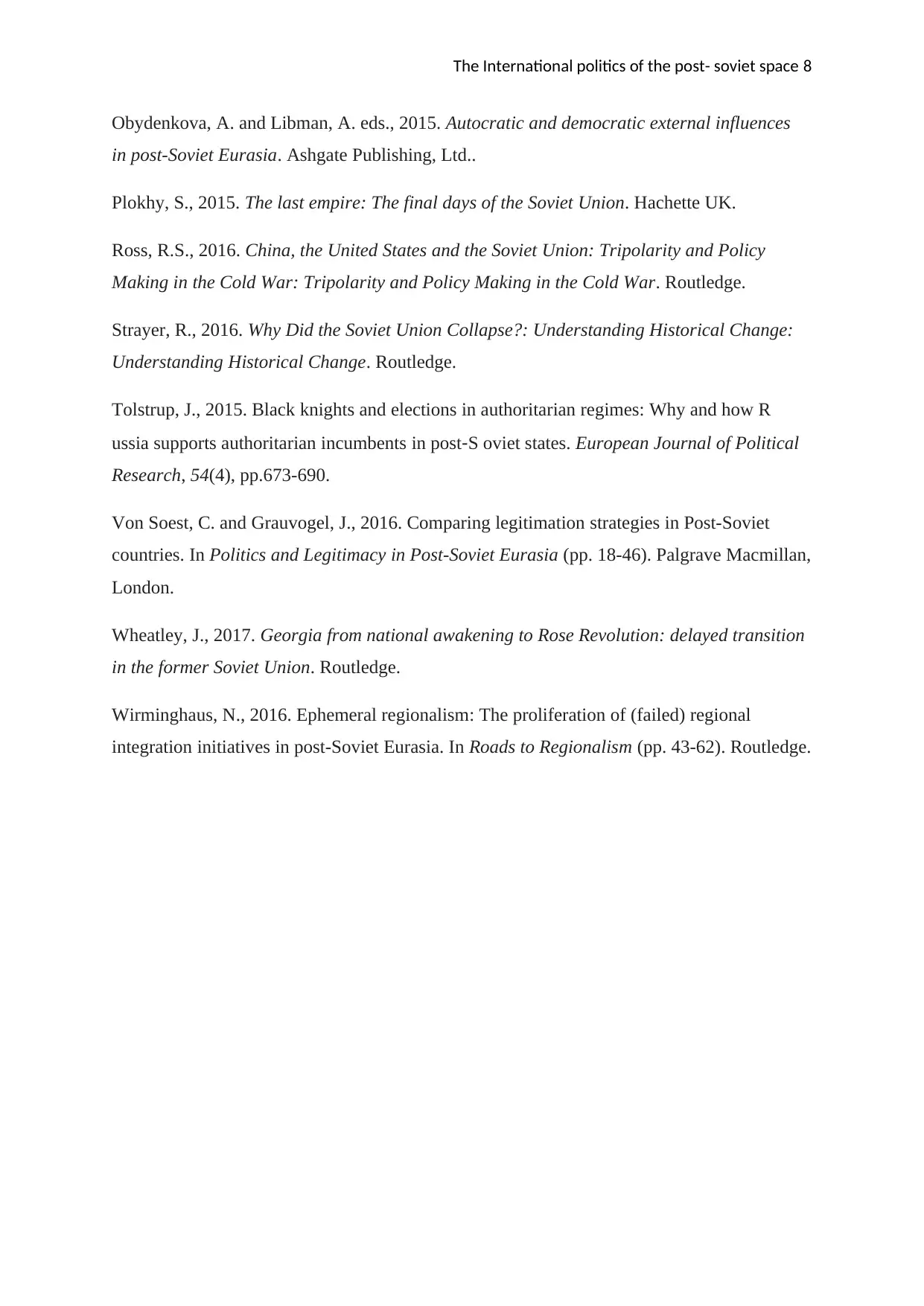
The International politics of the post- soviet space 8
Obydenkova, A. and Libman, A. eds., 2015. Autocratic and democratic external influences
in post-Soviet Eurasia. Ashgate Publishing, Ltd..
Plokhy, S., 2015. The last empire: The final days of the Soviet Union. Hachette UK.
Ross, R.S., 2016. China, the United States and the Soviet Union: Tripolarity and Policy
Making in the Cold War: Tripolarity and Policy Making in the Cold War. Routledge.
Strayer, R., 2016. Why Did the Soviet Union Collapse?: Understanding Historical Change:
Understanding Historical Change. Routledge.
Tolstrup, J., 2015. Black knights and elections in authoritarian regimes: Why and how R
ussia supports authoritarian incumbents in post‐S oviet states. European Journal of Political
Research, 54(4), pp.673-690.
Von Soest, C. and Grauvogel, J., 2016. Comparing legitimation strategies in Post-Soviet
countries. In Politics and Legitimacy in Post-Soviet Eurasia (pp. 18-46). Palgrave Macmillan,
London.
Wheatley, J., 2017. Georgia from national awakening to Rose Revolution: delayed transition
in the former Soviet Union. Routledge.
Wirminghaus, N., 2016. Ephemeral regionalism: The proliferation of (failed) regional
integration initiatives in post-Soviet Eurasia. In Roads to Regionalism (pp. 43-62). Routledge.
Obydenkova, A. and Libman, A. eds., 2015. Autocratic and democratic external influences
in post-Soviet Eurasia. Ashgate Publishing, Ltd..
Plokhy, S., 2015. The last empire: The final days of the Soviet Union. Hachette UK.
Ross, R.S., 2016. China, the United States and the Soviet Union: Tripolarity and Policy
Making in the Cold War: Tripolarity and Policy Making in the Cold War. Routledge.
Strayer, R., 2016. Why Did the Soviet Union Collapse?: Understanding Historical Change:
Understanding Historical Change. Routledge.
Tolstrup, J., 2015. Black knights and elections in authoritarian regimes: Why and how R
ussia supports authoritarian incumbents in post‐S oviet states. European Journal of Political
Research, 54(4), pp.673-690.
Von Soest, C. and Grauvogel, J., 2016. Comparing legitimation strategies in Post-Soviet
countries. In Politics and Legitimacy in Post-Soviet Eurasia (pp. 18-46). Palgrave Macmillan,
London.
Wheatley, J., 2017. Georgia from national awakening to Rose Revolution: delayed transition
in the former Soviet Union. Routledge.
Wirminghaus, N., 2016. Ephemeral regionalism: The proliferation of (failed) regional
integration initiatives in post-Soviet Eurasia. In Roads to Regionalism (pp. 43-62). Routledge.
⊘ This is a preview!⊘
Do you want full access?
Subscribe today to unlock all pages.

Trusted by 1+ million students worldwide
1 out of 9
Your All-in-One AI-Powered Toolkit for Academic Success.
+13062052269
info@desklib.com
Available 24*7 on WhatsApp / Email
![[object Object]](/_next/static/media/star-bottom.7253800d.svg)
Unlock your academic potential
Copyright © 2020–2026 A2Z Services. All Rights Reserved. Developed and managed by ZUCOL.
